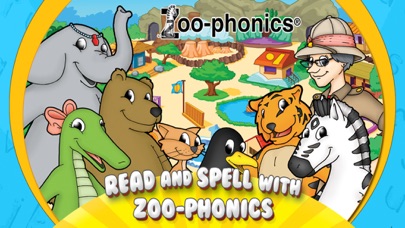
**GAME INTENDED FOR iPADS AND LARGE SCREEN PHONES**
Read and Spell with Zoo-phonics Interactive Games supplement the award winning and widely used Zoo-phonics Multisensory Language Arts Program.
In the Zoo Library, children may choose from 88 books located on the bookshelves. They can see that there are 3 different colors of books. The colors designate the level of difficulty (see below). The books are tiny and numbered. Make sure you teach children to touch one book at a time, very carefully. Each Mini-Book has a Word List at the end of it. Encourage children to Signal and sound out and read the words.
The colors designate the level of difficulty:
• The yellow books have simple VC/CVC (vowel-consonant; consonant-vowel-consonant) words, the schwa words “a” and “the,” and a few blend words. This level starts with phrases and short sentences and becomes slightly more advanced.
• The blue books contain blend, digraph, and double consonants words, with some long vowels. The sentences are a little longer than in the yellow books.
• The green books are more advanced with harder phonetic concepts, such as long vowels, diphthongs, r-controlled vowels, silent letters, and soft sounds. There are more words and sentences to each page. Complexity of the sentence structure is added, and yet, is still accessible to the children.
As soon as the book opens, a narrator will read the book aloud. As the words are read, the spoken word turns red! To turn the page, click on the green arrow pointing to the next page.
Lesson Objectives. The child will:
1) use eyes to track from left-to-right
2) learn to listen carefully and follow directions
3) make decisions
4) learn how to navigate and manipulate interactive elements on a screen using eye-hand coordination
5) have a vehicle to practice sound-blending using Signals if needed
6) learn basic to more advanced reading skills
7) become aware of sentence structure, including uppercase letter and punctuation usage
8) understand that words and sentence structure get more challenging as she or he gains phonics and reading skills
About Zoo-phonics
Teach your students the alphabet in TWO WEEKS! Faster than you ever expected your students will be reading, spelling and writing!
The Zoo-phonics Multisensory Language Arts Program is a kinesthetic, multi-modal approach to learning all aspects of language arts, including vocabulary development and articulation, based on phonics and phonemic awareness.
The principle of Zoo-phonics maximizes understanding, memory, utilization and transference to all areas of the reading, spelling and writing process in a playful and concrete manner.
Zoo-phonics is a method developed to make children strong readers and spellers using a “phono” (hearing), “oral” (speaking), “visual” (seeing), “kinesthetic” (moving), and tactile (touching)—whole brain approach. Students actually learn the sounds of the alphabet and advanced phonemic concepts through an easily understood, concrete method of presentation.
Zoo-phonics uses animals drawn in the shapes of the letters for ease in memory. A related body movement is given for each letter. This concrete approach cements the sounds to the shapes of the letters. Lowercase letters and their sounds are taught first (needed 95% of the time in text), capital letters and letter names are taught later.
Zoo-phonics also provides a springboard for all other academia such as math, art, music, cooking/nutrition, social studies, science, grooming, physical education and sensory/drama.
Every aspect of the program has been field-tested and found to be effective. Educational research repeatedly supports the focus of phonics in early reading programs, as well as the educational benefits of pictorial mnemonics and kinesthetic approaches to learning that are unique to Zoo-phonics.
Currently Zoo-phonics is used throughout the United States and internationally as a highly effective language arts program.



